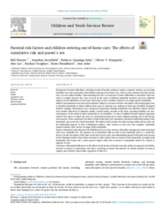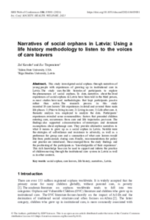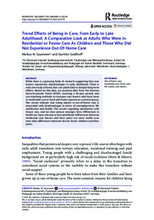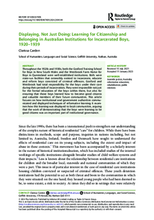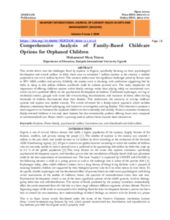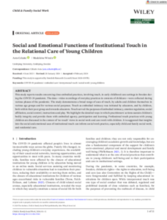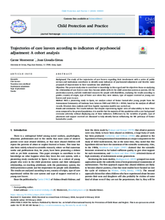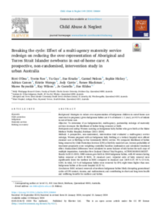Displaying 41 - 50 of 771
This retrospective, national-scale, observational e-cohort study of children entering care in Wales looked at the impact of cumulative risks of parental difficulties on the likelihood of care entry and the impact of the parent's sex.
This study investigated social orphans through narratives of young people with experiences of growing up in institutional care in Latvia. The study uses the life histories of participants to explore the phenomenon of social orphans.
The present qualitative study seeks to understand parents' perceptions of home or institutional care for children with disabilities. The study utilized an exploratory qualitative approach paradigm with five focus groups in the Qassim region of Saudi Arabia.
This article addresses two issues: whether the inequalities faced by cared for children will persist in different stages of their lives and whether these inequalities are dependent on the specific out-of-home care setting, i.e. residential or foster care. The authors examine data from the German Socio-Economic Panel (SOEP), covering a 50-year period.
This article focuses on how institutional and government authorities communicated and displayed techniques of reformative learning in New South Wales and Queensland. It examines how this learning was displayed to local communities, arguing that the work of demonstrating that the incarcerated boys in their care were learning to be good citizens was an important part of institutional governance.
This study examines the health of Canadian youth in care and their engagement with the Canadian health care system on a population level.
This article delves into the challenges faced by orphans in Nigeria, specifically focusing on their psychological development and overall welfare. The article advocates for a family-centric approach, which includes adoption, community-based upbringing, and initiatives to strengthen existing families.
This study reports results concerning close embodied practices, involving touch, in early childhood care settings in Sweden during the COVID-19 pandemic.
The present study conducted in Spain analyzed the relationship of care leavers once they become adults with the child protection system as parents, the penitentiary system, and residential resources for people with disabilities, analysing the results according to gender, country of origin, type of foster care when they were minors, type of support received as young care leavers and years in care.
The objective of this study was to determine if an Indigenous-led, multi-agency, partnership redesign of maternity services at a maternity hospital in Brisbane, New Zealand would decrease the likelihood of Indigenous babies being removed at birth and being placed in out-of-home care..

